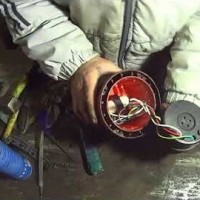Which humidifier is better - steam or ultrasonic? Comparing two types of humidifiers
For normal human life indoor humidity should be 40-60%.Dry air irritates the mucous membranes, can provoke the development of allergies and leads to a decrease in immunity. An incorrect microclimate in a room is especially harmful for young children - they begin to be capricious for no reason, sleep poorly and often get sick.
To optimize the level of humidity in the room air, some people hang wet towels in the bedroom or place a bucket of water. Agree that such methods are not entirely aesthetic. You can solve the problem with the help of air humidifiers. But they are presented in a wide range and you don’t know how to choose the best option?
In this article, we will figure out which air humidifier is better than steam or ultrasonic, for which we will consider in detail the characteristics of existing types of air humidifiers. We’ll also talk about the rules for caring for such equipment.
The content of the article:
Features of steam humidifiers
Domestic humidifier helps create the most comfortable microclimate for a person in the house. When used correctly, the device will help get rid of poor health, irritability, and drowsiness.
To compare a steam humidifier with an ultrasonic one, you first need to familiarize yourself with the features and characteristics of each of them. So, let's start with steam.
How does the device work and work?
A steam humidifier consists of a heating element, a water tank and a supply valve. During operation of the device, the liquid turns into steam and goes outside, quickly humidifying the room.
A working steam humidifier can be compared to a boiling electric kettle. Only it does not turn off after the water boils. Liquid is supplied to the heating element in small portions. This principle of operation allows you to save electricity, since you do not need to heat the entire volume of water at once.
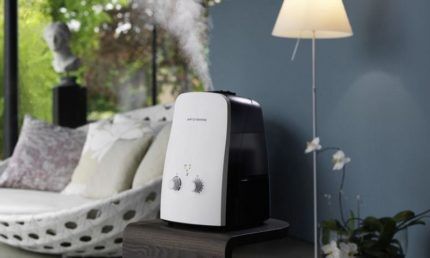
Steam humidifiers have high performance. Changes in humidity levels in a room occur quite quickly. Some models are capable of evaporating up to 700 ml of water in an hour of operation. Therefore, you need to take care of the device so as not to turn the room into a “steam room”.
Many versions of steam-type devices are designed for large premises and industrial conditions: museums, hangars, warehouses and others. There are also household models. They are ideal for winter gardens and indoor greenhouses.
Advantages of steam humidifiers
If a steam-type humidifier is selected taking into account the area of the room, installed correctly, and serviced on time, then it will work for a long time and household members will notice only the positive qualities of the device.
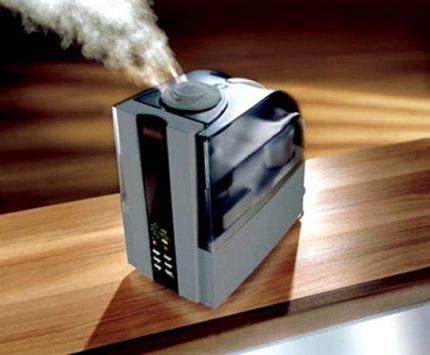
Advantages of the device:
- affordable price and no additional costs for the purchase of filters, as well as cartridges for water softening;
- rapid air humidification up to 60% — the injection of moisture in the room occurs faster with their help than with ultrasonic analogues;
- Thanks to boiling water, the steam released is completely sterile — it contains no germs and bacteria;
- The efficiency and performance of the device does not depend on temperature in room;
- some variations have additional functions and can be used as a flavoring or inhalant;
- safe use — the device automatically turns off if all the water from the tank has evaporated or the lid is not tightly closed.
Steam humidifiers are unpretentious. Their steam does not leave a white residue on the flooring, furniture or walls. You can fill the device’s container with tap water.
The device does not require filters, but its tank must be periodically descaled.
Main disadvantages of devices
The relatively high consumption of electricity and water are the main disadvantages of steam devices.
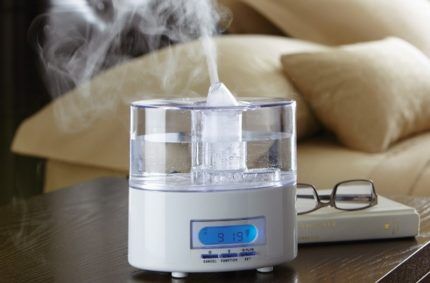
Depending on the model and power, the device consumes from 200-600 W. Installing such a high-performance device in a large room can add up to a significant expense.
Also the disadvantages include:
- ability to exceed the required humidity level 50-60% - this is typical for models without a built-in hygrostat;
- loud noise in the process of boiling, which can interfere with comfortable sleep;
- scale formation on heating elements or other elements - deposits must be removed in time or the device will fail;
- condensation formation — there should be no books or wooden furniture near the device, as they may suffer from constant exposure to steam;
- possibility of getting burned — it is not recommended to install steam humidifiers in children’s rooms, since hot steam is unsafe, and boiling water inside the tank can cause harm if the device is accidentally knocked over.
Not all steam humidifier models are equipped with a hygrostat. Without constant monitoring, they can over-humidify the room. Too high humidity promotes the growth of bacteria and mold development. Therefore, it is better to purchase models with a built-in humidity sensor or buy a hygrometer separately and monitor moisture levels.
Steam humidifiers increase the temperature in the room by 1-2 degrees. This feature can be attributed to both advantages and disadvantages. During the cold season, an additional heat source will be useful. If the room is hot, then this function will definitely not provide comfort to the household.
Characteristics of ultrasonic humidifiers
During operation, ultrasonic units produce cold steam. They consume minimal electricity because there is no need to heat water. Let's look at their main characteristics in more detail.
Design and principle of operation
Such humidifiers are sensitive to the quality of the supplied liquid. They cannot function without water softener cartridges.
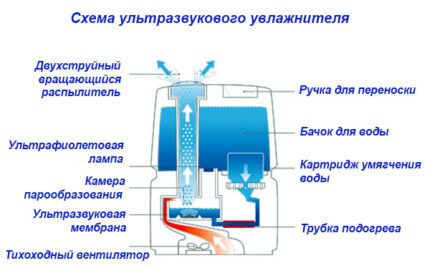
Operating algorithm of ultrasonic type units:
- Distilled or purified water is poured into the tank.
- Water flows by gravity into the cartridge and is further purified.
- The heating tube brings the liquid to the desired temperature.
- Water is transported to the evaporation chamber. There, a piezoelectric element (membrane) breaks the liquid into small particles, forming a cloud of cold vapor.
- A fan blows damp mist into the room.
From the outside, it may seem that the “fog” is hot, but it is not. If you put your hand under the stream of steam, you only get a feeling of freshness and coolness. Such device options are more preferable for use in children's rooms.
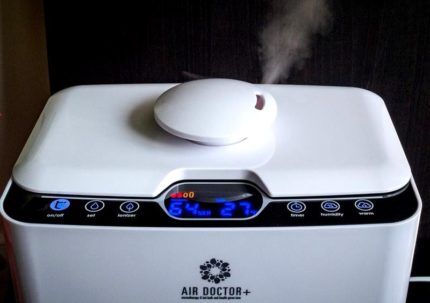
Expensive models of humidifiers are equipped with an ultraviolet lamp. It treats the steam before releasing it into the room, destroying microorganisms and bacteria.
Some useful features of some devices also include the ability to spray water mist in all directions. There are devices equipped with anti-foaming and self-cleaning functions.
Pros of ultrasonic humidifiers
Easy to use, easy to maintain, and maintain an optimal level of humidity – these are the main positive characteristics of ultrasonic humidifiers.
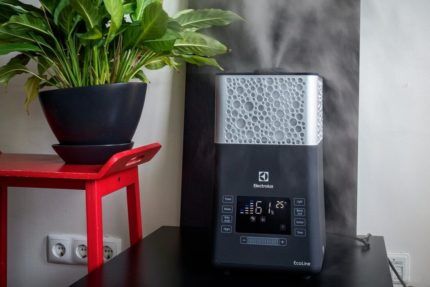
Ultrasonic humidifiers typically produce a cool water mist, so they don't have to waste energy on the process of boiling water. There are also models with a steam heating function up to 80 degrees.
Benefits of humidifiers:
- almost silent operation;
- safe use;
- extensive set of functions;
- creation of a steam curtain;
- during normal operation, power consumption is up to 40 W;
- possibility of changing the direction of the steam jet.
Models that are equipped with a hygrostat turn off automatically when the required humidity in the room is reached. Some options have backlighting for escaping steam. These humidifiers are ideal for humidifying the air in rooms where children live.
To familiarize yourself with recommendations for choosing an ultrasonic humidifier and operating rules, please go to following link.
Significant disadvantages of devices
The devices are sensitive to water quality. They quickly fail if their capacity is pour water from the tap. For normal functioning of humidifiers, you need to use distilled or at least filtered water.
Disadvantages include the high cost of devices equipped with a number of additional functions.
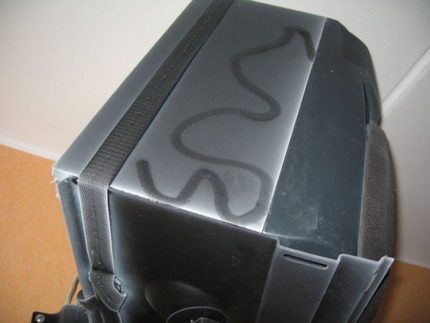
Which humidifier is better?
Steam and ultrasonic humidifiers have many advantages. And choosing the best one among them is quite difficult - both types are capable of qualitatively improving the microclimate in the room.
However, the device must be selected for specific operating conditions.First of all, the area of the room is taken into account, and the power of the device is selected according to it.
In small rooms it is advisable to use ultrasonic models, and in large rooms - steam models.
An ultrasonic type device is suitable if:
- you need a humidifier that is compact in size and can be carried;
- not in the family allergy sufferers, and the air in the area where you live is not too polluted;
- there is no desire to incur large energy costs in order to improve the microclimate in an apartment or house;
- light sleeper and there is a need to sleep in perfect silence;
- You need to equip your children's room with a humidifier.
Despite the minimal energy consumption, you still have to incur some costs with ultrasonic humidifiers: the purchase of filters, cartridges and distilled water.
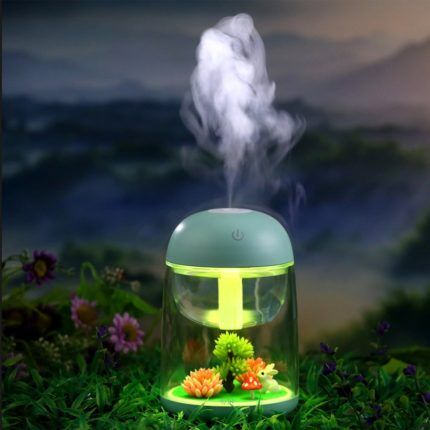
Steam types of devices are optimal for families in which the children have already grown up, and no one wants to check the steam temperature with their palm or open the lid during operation.
Using the devices, you can also perform inhalations and disinfect rooms. If such functions are in demand, you should definitely buy a steam humidifier.
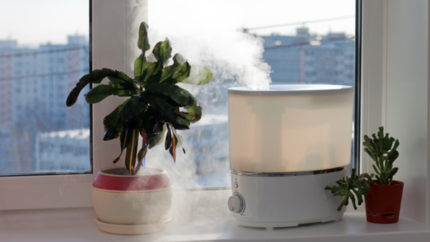
When choosing a device for humidifying the air, you also need to pay attention to the rate of water consumption, as well as the volume of the tank.If it is not possible to add water every 8-12 hours, then it is better to buy a unit with a tank volume of 6 liters or more.
We have provided more recommendations on choosing an air humidifier for your home and apartment in next publication.
Features of caring for humidifiers
Regardless of the cost, modification and number of functions, any devices require timely care and maintenance. For example, in some models of ultrasonic humidifiers it is recommended to change filters or cartridges every 3 months.
Mandatory procedures also include:
- washing the device - performed once a week;
- descaling, which is especially important for steam humidifiers - the procedure is carried out as the device becomes dirty, on average once every 2 weeks;
- disinfection procedures - disinfect the device once a month.
Clean the humidifier using special products. They do their job well, but are expensive. You can also prepare your own cleaning agent from a solution of laundry soap and water (1:2) to combat stains.
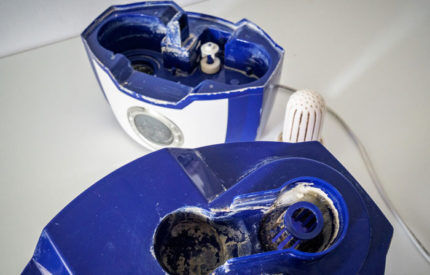
Regular bleach can be used as a disinfectant. To prepare the solution 1 tbsp. l. chlorine is diluted in 4 liters of water. The cleaning procedure should be performed on the balcony or street. After disinfection, you need to thoroughly wash the water tank. Cleaning is carried out with a soft cloth, since hard elements can scratch the equipment.
Timely cleaning and correct operation allows you to extend the life of your household humidifier.
Conclusions and useful video on the topic
A detailed overview of existing types of humidifiers is shown in the video:
In the article we examined the operating features, advantages and disadvantages of the most popular types of humidifiers. Steam options are cheaper and can even be used for inhalation. However, they are not suitable for everyone. Ultrasonic devices are completely safe and can be used to humidify children's rooms. Their disadvantages include the need to periodically replace filters.
What type of humidifier do you prefer? Are you satisfied with your choice? What pros and cons have you discovered while using your humidifier? If you still have questions after reading this article, ask them to our experts and other site visitors - the feedback form is located below.



